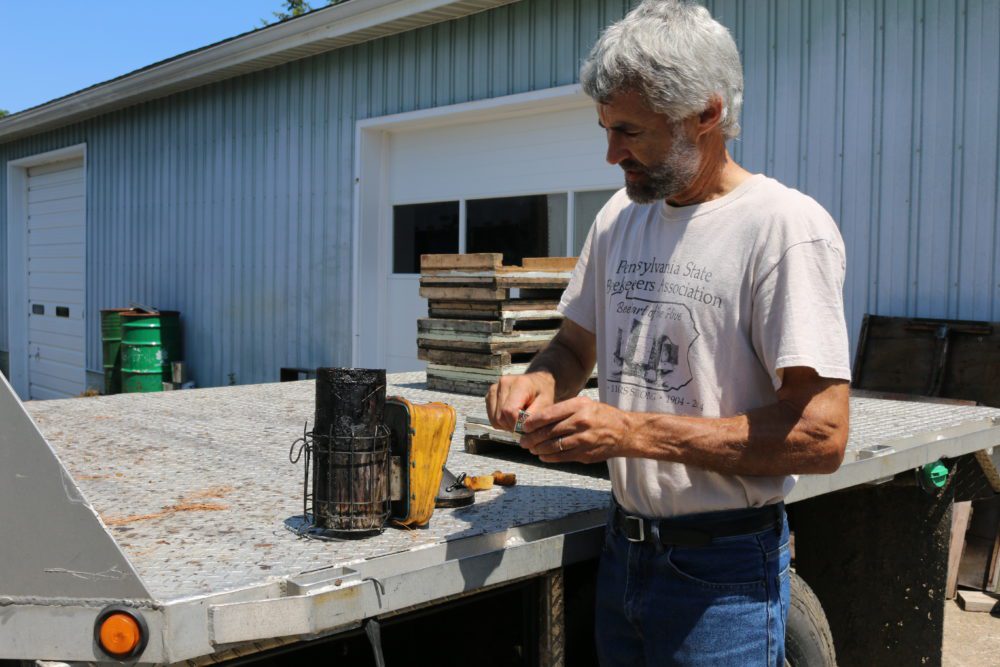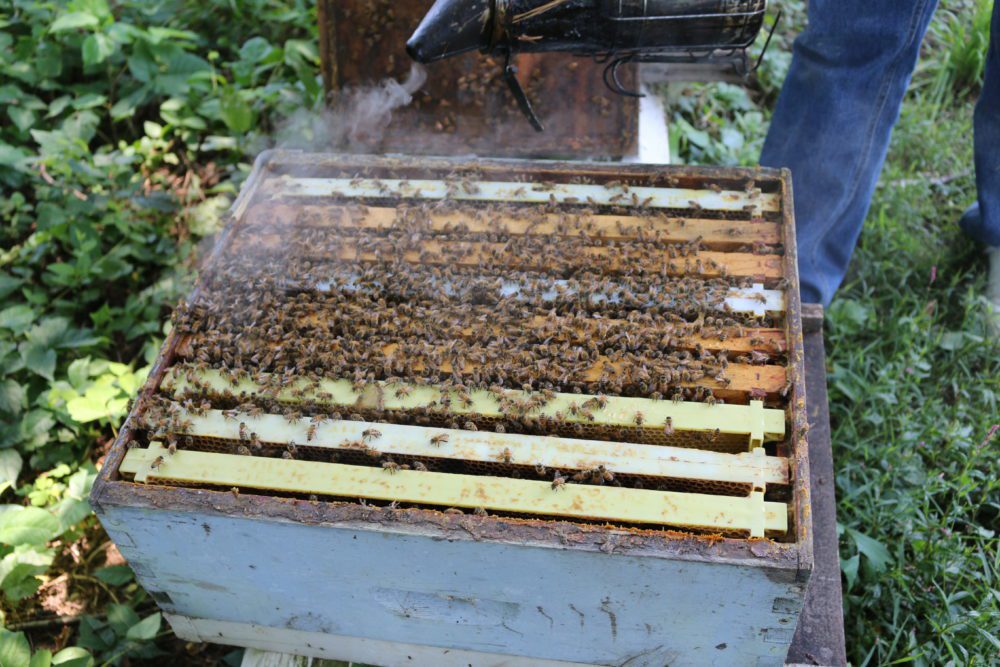For beekeeper Tim Miller, it all started as a hobby.
“I had spent 3 months down in Kentucky working with a home improvement program with our church. Each week youth groups would come down for a work week, and I would coordinate the groups. We had a break one week, and I knew there was a beekeeper that had some hives up in the mountains, so I went along with them and I was totally fascinated.”

After starting his first hive in 1994, Tim’s fascination soon developed into a workforce of 300 hives, providing varieties of honey for The Honeybee Shoppe in Manheim, PA. During the summer months, the hives pollinate orchards and crops at over 50 different locations in Lancaster County. By early September, Tim has the hives taken to Tioga County in Northern Central Pennsylvania, where the dense, mountainous forest provides cooler temperatures for the honeybees. Here, the honeybees pollinate wildflowers — particularly goldenrod — to produce the unfiltered Wildflower Honey that you can find at Kimberton Whole Foods.
Tim and his wife own the Honeybee Shoppe, located just steps from the backdoor of his home — a property that was formerly owned by a beekeeper. Here, the honey is harvested, processed and bottled with the help from his daughters and nephew. Beekeeping holds a special place for the Miller family, “my great-grandfather had honey bees, maybe a dozen to 15 hives. He was also a dairy farmer. We don’t have any pictures of him with his cows, but we do have a picture of him with his bees…and I treasure that picture because that’s part of the heritage.”

The property line is peppered with hives, shaded by trees and protected on either side by tall fields of corn. Tim’s just added new queen bees to these hives and we examined how the colonies have taken to them. He smokes the hive to warn and calm them; he can sense the state of the colony as he pulls back the lid. Without a queen, there’s a sense of disorganization and much louder, roaring hum. “This hive is like a body, each bee is like a cell. Each bee that emerges as a young new bee is like a new cell in the body, but working all together it’s amazing what they can do.”
Since the 1980’s beekeepers have been struggling with obstacles like parasites, lack of diversity and neonicotinoid-based pesticides, all of which are suspect to contributing to Colony Collapse Disorder. This has been devastating to health and productivity, “we don’t have large colonies like we used to have, and as a result we don’t have a large production like we used to have.”
What can you do to help the bees?
Tim urges, “don’t spray the broadleaf”, a common weed found in lawns. “We all want picture perfect yards but then you don’t see a clover in the yard. Perfectly manicured lawns are like a desert to a honey bees and butterflies.”






I recently purchase your honey and love it’s taste and light smooth texture. I have been eating raw honey for about 20 years. I use to get it some times from Canada but was told later that local was better and healthier. My concern and question about the honey is that there is no heating and that the pollen and the propolis are contain within it contex. Other honeys have affected me in various ways but yours is just naturally agreeable to my system. Thank you.
I bought a large bottle from your stand at the farmers market last Tuesday. The women told me that what i took was her favorite. It is bad meaning like sugar was added to it. Price was like $ 22.00 i am not a happy camper. When i was living in Adamstown and went to the Green Dragon the big shop for Honey would let you taste. With your stand you can not. I will not buy from you again. I am now in Campbelltown and if asked will let people know.
Sincerely,
Charles J. Kollman.
Do you have a shop at your home location and what are your hours? I have a Kimberton Whole Foods shop near where I live outside Coatesville, PA Does the Downingtown store stock your honey?
Hi Charles,
Thanks for reaching out to Kimberton Whole Foods. We are sorry to hear you were disappointed with your experience with The Honeybee Shoppe’s honey. Our grocery store sells their product, but we are not affiliated with them in any other way. If you would like to contact The Honeybee Shoppe directly, please call (717) 665-4350. We are also happy to pass on this feedback http://www.kimbertonwholefoods.com/wp-admin/edit-comments.php#comments-formto them. We hope this helps. Best, KWF
Hello Dennis,
Yes, The Honeybee Shoppe brand honey can be found at our KWF Downingtown location at 150 E Pennsylvania Ave, Downingtown, PA 19335. This location is open 9AM-8PM (Monday – Friday), 9AM-6PM (Saturday) and 10AM-6PM (Sunday). The packaging will label the honey as: Pennsylvania Pure Wildflower Honey.
Thank you,
KWF
Is the honey unheated, it seems a bit runny? Also, is it unfiltered, I don’t see any specks in it? I am simply looking for no heat or filtered honey, thank you! (:
Hi Tammy,
Thank you for reaching out to KWF! Currently, there is not a uniform regulation or certification for raw honey temperatures. This honey is heated to a low temperature of 115 degrees to melt from the frames. It’s suggested that anything at or below the average hive temperature can be considered raw. The processor labels his honey “unfiltered” compared to commercial honey products, since it is simply single strained through a cloth to remove any bee parts, which would contribute to the look of the honey that you mentioned. We would suggest the brand, Really Raw Honey if you are looking for a creamy honey that contains honeycomb, pollen and propolis. You’ll find this available at all stores. Thank you for your feedback, we appreciate it and will update our blog post accordingly. All the best, KWF
I am very interested in doing some backyard beekeeping. I have read several books on the subject, but would love to take a class from an experienced keeper. Do you offer classes or workshops for beginners?
Hi Lisa, Kimberton Whole Foods does not offer classes on beekeeping, however local beekeeping associations would. The Chester County Beekeeping Association is having their annual conference March 11, 2017. http://www.chescobees.org/2017-seminar-speakers-and-agenda/
I am an amateur beekeeper looking to purchase a nuc..or two. Might Tim Miller be able to sell or refer me to someone ? (Keeney and Ziegler got me started 20 yes ago)
717 644-1111. TIA !
Hi Thom,
Here’s the number for The Honeybee Shoppe: (717) 665-4350. Hope this helps!
Thank you,
Becca at KWF
Hi, do you ship your honey?
Hello Gloria, Thank you for reaching out. We do not ship honey from our stores, but you might try reaching out to The Honeybee Shoppe directly to see if they might do so: (717) 665-4350 Have a great day! -Emily at KWF
Do you have bee pollen
Hello Xavier, Thank you for reaching out! We carry bee pollen from Swarmbustin’ Honey at all of our stores.
Can you ship your honey? We do not have any shops our way that carry your Orange blossom pure honey. Also, is this available large sizes (above the 2 lb. bottle)?
Thanks so much and love your honey!
Thanks for reaching out! You can contact The Honeybee Shoppe directly, here: (717) 665-4350